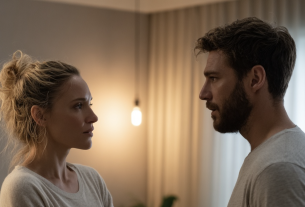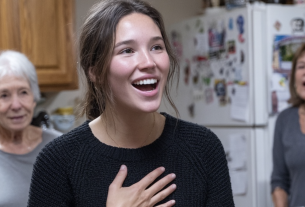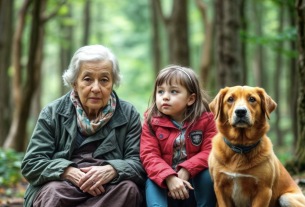Lena stood in front of the crooked little house, clutching a crumpled piece of paper with the address in her hand. The wind tickled her neck, ruffling her light jacket, and inside she felt empty—like the windows of this abandoned dwelling. Twenty years had passed inside the walls of an orphanage, and now she was here, alone, with a small suitcase and a handful of money. What came next—Lena did not know.
The house looked as if it had been abandoned back in the last century. The roof sagged, the shutters hung by a thread, and the porch creaked dangerously underfoot. The girl felt tears welling up in her eyes. Was this really all she had after twenty years of living without a family?
Suddenly, the neighbor’s gate creaked open. An elderly woman in a colorful robe stepped onto the narrow path. Noticing Lena, she stopped, looked intently at the girl, and decisively approached her.
“What are you doing standing here?” she asked kindly. “You’ll catch a chill. It’s cold, October outside, and you’re almost without an outer layer.”
Lena took out a notebook and quickly wrote: “They gave me this house. I’m from an orphanage. I don’t speak.”
The woman read it and sighed sympathetically:
“Oh, poor girl! My name is Margarita Andreevna. And yours?”
“Lena,” she replied, clumsily writing the letters.
“Well, why stand out here in the cold? Come with me, warm up, have some tea. Tomorrow we’ll look at the house; maybe something can be fixed. There are men in the village who’ll help.”
Margarita Andreevna’s house smelled of fresh pies and coziness. Yellow curtains, embroidered tablecloths, houseplants on the windowsills—all of it breathed warmth, something Lena had never known. On the wall hung a photo of a young man in a police uniform.
“That’s my son, Evgeny,” the hostess said, following the girl’s gaze. “He’s a district police officer. A nice man, but rarely home. And you, child, how will you live? Do you need a job?”
Lena nodded and wrote: “I really need one. Any job. I can clean, cook, care for people.”
“Listen, I have an acquaintance—Valentina Petrovna. She’s very old, needs a caregiver. She has relatives, but they don’t really help. They expect more than they give. Maybe you could go to her? I’ll give you the address and explain how to find it.”
Valentina Petrovna’s house was large but neglected. The paint was peeling, the garden overgrown, and junk lay scattered in the yard. The door was opened by a woman about forty with a tired, irritated face.
“Are you a caregiver?” she asked, looking Lena over. “I’m Olga, the granddaughter. And this is Artem, my husband.”
The man, sitting in an armchair with a beer bottle, lazily nodded without taking his eyes off the screen. He smelled of alcohol.
“There’s a lot of work,” Olga continued, lighting a cigarette. “Grandma’s almost bedridden—feeding, washing, cleaning. She’s nervous, might be cranky. We pay three thousand a month, food’s whatever’s available. Is that okay?”
Lena showed her notebook: “Okay. I’m mute, but I understand everything and work carefully.”
“Mute?” Olga exchanged glances with her husband. “Well, maybe that’s better. No chatting, no complaints. Come on, I’ll introduce you to grandma.”
Valentina Petrovna lay in semi-darkness, the curtain-drawn room smelling of medicine and mustiness. Her body was wasted, her gaze full of pain and loneliness. Lena involuntarily shrank inside, seeing that sorrow.
“Grandma, this is Lena, she’ll take care of you,” Olga said loudly. “Artem and I are going away for a week. Make yourself comfortable.”
The old woman looked at Lena. Something alive flickered in her eyes—hope?
“What’s your name?” Lena wrote.
“Valentina Petrovna… And yours?”
“Lena. I will take good care of you.”
For the first time that day, a shadow of a smile crossed the old woman’s face.
“Well, we have to go,” Olga said, heading for the door. “Food’s in the fridge, medicine nearby. Call if anything—but only in an emergency.”
When they left, Lena got to work. Everything was in terrible condition—dust, dirty dishes, floors not washed for a long time. But most of all, she worried about Valentina Petrovna’s state. Helping her wash, Lena noticed bruises on her hands—clearly not from accidental falls.
“How did this happen?” she wrote.
“I fall often,” the grandmother whispered, lowering her gaze. “I’ve gotten weak…”
Lena didn’t believe her but said nothing. She started by airing the room, changing the bedding, gently washing and dressing Valentina Petrovna. She made a light soup and patiently fed her.
“I haven’t eaten something this tasty in a long time,” the old woman said, almost crying. “Thank you, dear.”
Over the month, Valentina Petrovna transformed. Lena fed her fresh food, read books aloud, helped her move, arranged flowers on the windowsill, and played old TV series. The grandmother even began flipping through photo albums, telling stories of her youth.
“Lena, you’re like a light in the window to me,” she said. “I don’t know how I’d survive without you. I haven’t felt this cozy for a long time.”
And the house changed too—cleaner, cozier. Lena washed everything, hung clean curtains, created an atmosphere of care and warmth.
But when Olga and Artem came, the mood immediately changed. They looked disapprovingly at the “pampered” grandmother, grumbled about extra food and medicine.
“Why does she need so much food?” Olga complained. “She’ll manage anyway.”
After one of these visits, Lena found new bruises on Valentina Petrovna’s body. The grandmother cried and refused to eat.
“What happened?” Lena wrote.
“Nothing, child… just old age taking its toll,” Valentina Petrovna answered, hiding her tears. “No one needs me anymore.”
Lena understood she had to act. The next day she went to the city electronics store. There, with the help of notes and gestures, she explained to the seller.
“A hidden camera?” he guessed, reading the note. “Why do you need it?”
“To protect someone who can’t stand up for herself,” Lena wrote in the notebook.
Mikhail—that was the young seller’s name—looked at the girl attentively. His eyes showed genuine sympathy, and his smile was kind and open.
“I understand. This camera will work—compact, with good quality recording to a memory card. And…” he hesitated a bit, “take it for free. I feel it’s important. Just be careful.”
Lena installed the device in Valentina Petrovna’s room, carefully hiding it. On her day off, she reviewed the footage and was horrified by what she saw.
In the video, Artem roughly shook the old woman:
“Where’s the money? You got your pension—hand it over! We need money for the car!”
“Son, I have nothing, it all went to medicine…” the grandmother cried. “Why are you treating me like this?”
“You’re lying!” Olga shouted. “You’re hiding it somewhere! And the house should be in our name by now!”
Artem hit Valentina Petrovna in the face. She fell on the bed, crying from pain and humiliation.
“Next time we’ll bring the papers,” Olga said coldly. “Sign them—or you’ll go to a nursing home. They’ll teach you how to live there.”
Lena turned off the video, trembling with rage and grief. Tears ran down her cheeks. She went to the grandmother and wrote: “Why do you endure this? You have to report it! This is a crime!”
“Who will protect me, child?” Valentina Petrovna whispered, squeezing the girl’s hand. “I’m old and sick. They’re young and strong. Who will believe me against them? And there’s nowhere for me to go—they’re relatives…”
“I believe you. And not only me,” Lena replied and ran to Margarita Andreevna.
“Is Evgeny home?” she wrote, out of breath from running.
“At home, what’s wrong, child?” the woman asked, noticing her frightened state.
Lena showed the recording. Evgeny, a man about thirty-five with a determined look, watched the video and immediately stood up:
“This is a criminal offense—threats, physical violence, extortion. We need to go before they disappear.”
“Mom, call an ambulance for Valentina Petrovna,” he said, putting on his uniform. “We need to document the injuries.”
A real drama unfolded in the house. Olga and Artem screamed that everything was fabricated, but the video recording was irrefutable evidence.
“It’s edited! We never hurt grandma!” Olga shouted.
“The expert examination will show the truth,” Evgeny calmly replied. “You’re under arrest on suspicion of abuse and extortion.”
He put handcuffs on them, and Lena stood next to Valentina Petrovna, holding her hand.
The grandmother was hospitalized. Doctors found multiple injuries—broken ribs, bruises, signs of constant abuse.
“If not for you,” the doctor said, “it would have been too late. At her age, such injuries can be fatal.”
Lena was left alone in the big house, but Margarita Andreevna offered her to move in:
“Live with me until Valentina Petrovna gets stronger. Then we’ll see. You’re a real heroine, girl. Not everyone dares to do what you did.”
Two weeks later, Valentina Petrovna returned home. She was weak, but there was a light in her eyes.
“Lena, you saved my life,” she said, hugging the girl. “How can I thank you?”
“Just get better and live peacefully,” Lena wrote.
“You know,” the grandmother said, taking her hand, “I will leave you the house in my will. I’ll handle everything through a notary. You deserve it more than my ‘relatives.’”
Lena wanted to refuse, but Valentina Petrovna was adamant:
“You deserve it, period. For now, live here, take care of me. But not as a client—like a granddaughter. A real one.”
With each day, life got better. Olga and Artem were sentenced with a suspended sentence and banned from approaching Valentina Petrovna. They disappeared from her life.
Mikhail, the store clerk, became a frequent visitor—it turned out he was Margarita Andreevna’s grandson and had long admired Lena’s courage.
“Lena,” he said one day, sitting with her in the garden, “have you tried voice therapy? Maybe doctors can help?”
“I’m afraid. What if it doesn’t work? I’m used to being silent,” she wrote.
“What if it works?” he smiled gently. “Shall we try? I’m with you.”
The treatment was long, but the encouraging words and love helped Lena move forward. When she first said, “Thank you,” the house fell silent, then joy and tears filled it.
A year later, Mikhail proposed. He knelt down in that very garden and said:
“Lena, will you marry me? I love you just as you are.”
“Yes,” she answered. And that word sounded like the most wonderful thing those walls had ever heard.
The wedding was modest but full of warmth and love. Valentina Petrovna was the witness, Margarita Andreevna the honored guest. Evgeny brought a cake and toasted:
“To kindness, justice, and those who don’t remain indifferent to others’ suffering! To those who protect the weak!”
Lena also gave a speech:
“A year ago, I was alone, voiceless, without family or future. Now I have everything. Love, family, home. I know: good always conquers evil. The main thing is not to be silent when you see injustice.”
In the evening, they sat drinking tea—Lena, Mikhail, and Valentina Petrovna. The moon shone outside, the house was warm, filled with the aroma of pies and happiness.
“I thought the orphanage was the end of my story,” Lena said. “But it turned out to be just the beginning.”
“A new, real beginning,” agreed the grandmother. “And what a beautiful one!”
Mikhail took her hand:
“The most important thing is that we’re together. We will always protect each other. This is our home, our family, our happiness.”
Lena smiled. Now she knew: she had a home, a family, and a voice to speak the truth. And she would never be silent again when someone needed help. Because silence is complicity. And she chose the path of kindness, love, and protection.



